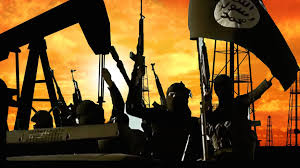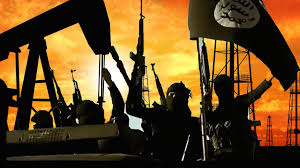
Turkey along with the government of Syrian President Bashar al-Assad and has been blamed again of buying cheap oil form the Islamic state – and this time it is not Russia.
On Friday there were media reports quoting a senior U.S. Treasury official that the Islamic State militants have made more than $500 million trading oil with significant volumes to Syria and Turkey.
The United States leads the coalition that includes France, Britain and Russia that is fighting the Isis who controls large parts of Syria and Iraq.
In an attempt to kill its leaders and cripple the oil wells which the group uses to finance its rule and attacks abroad, a U.S.-led coalition is bombing the hardline Sunni group, as is Assad's only big-power supporter Russia.
Militants were selling as much as $40 million a month of oil at the installations which was then spirited on trucks across the battlelines of the Syrian civil war and sometimes further, said U.S. Treasury Department official Adam Szubin in one of the most detailed public explanations of Islamic State's oil trade.
"ISIL is selling a great deal of oil to the Assad regime," Szubin, acting under secretary for Terrorism and Financial Intelligence with the Treasury, told an audience at Chatham House in London.
"The two are trying to slaughter each other and they are still engaged in millions and millions of dollars of trade," Szubin said of Assad's government and Islamic State, also known as ISIS or ISIL.
He further alleged that while the majority of the illegal oil ends up under Assad's control, some is consumed internally in Islamic State-controlled areas, some goes to the Kurdish regions and some to Turkey.
"Some is coming across the border into Turkey," Szubin said when asked for details on the money trail.
"Our sense is that ISIL is taking its profits basically at the wellhead and so while you do have ISIL oil ending up in a variety of different places that's not really the pressure we want when it comes to stemming the flow of funding - it really comes down to taking down their infrastructure," he said.
Szubin said that that the Islamic State had made more than $500 million from the oil trade but did not make it clear whether the $40 million a month estimate could be multiplied over a year.
Russia was among the first nations involved in the Syrian crisis to allege that Russia had intelligence that large amounts of oil and petroleum products were moving across the border from Islamic State territories to Turkey. This was alleged after Turkey had downed a Russian fighter jet last month.
The Russian allegations about he and his family were profiting from the illegal smuggling of oil from Islamic State-held territory were refuted by the son of Turkish President Tayyip Erdogan.
"There is no question that better security, closing the Turkish border to flows is a key component right now and we are looking to the Turks to do more in that respect," Szubin said.
"It's not just a financial issue - it is about foreign terrorist flows, it's about weapons and it's about financing. I think securing that border would pay major dividends in terms of intensifying the pressure and also reducing the threat," he said.
(Source:www.reuters.com)
On Friday there were media reports quoting a senior U.S. Treasury official that the Islamic State militants have made more than $500 million trading oil with significant volumes to Syria and Turkey.
The United States leads the coalition that includes France, Britain and Russia that is fighting the Isis who controls large parts of Syria and Iraq.
In an attempt to kill its leaders and cripple the oil wells which the group uses to finance its rule and attacks abroad, a U.S.-led coalition is bombing the hardline Sunni group, as is Assad's only big-power supporter Russia.
Militants were selling as much as $40 million a month of oil at the installations which was then spirited on trucks across the battlelines of the Syrian civil war and sometimes further, said U.S. Treasury Department official Adam Szubin in one of the most detailed public explanations of Islamic State's oil trade.
"ISIL is selling a great deal of oil to the Assad regime," Szubin, acting under secretary for Terrorism and Financial Intelligence with the Treasury, told an audience at Chatham House in London.
"The two are trying to slaughter each other and they are still engaged in millions and millions of dollars of trade," Szubin said of Assad's government and Islamic State, also known as ISIS or ISIL.
He further alleged that while the majority of the illegal oil ends up under Assad's control, some is consumed internally in Islamic State-controlled areas, some goes to the Kurdish regions and some to Turkey.
"Some is coming across the border into Turkey," Szubin said when asked for details on the money trail.
"Our sense is that ISIL is taking its profits basically at the wellhead and so while you do have ISIL oil ending up in a variety of different places that's not really the pressure we want when it comes to stemming the flow of funding - it really comes down to taking down their infrastructure," he said.
Szubin said that that the Islamic State had made more than $500 million from the oil trade but did not make it clear whether the $40 million a month estimate could be multiplied over a year.
Russia was among the first nations involved in the Syrian crisis to allege that Russia had intelligence that large amounts of oil and petroleum products were moving across the border from Islamic State territories to Turkey. This was alleged after Turkey had downed a Russian fighter jet last month.
The Russian allegations about he and his family were profiting from the illegal smuggling of oil from Islamic State-held territory were refuted by the son of Turkish President Tayyip Erdogan.
"There is no question that better security, closing the Turkish border to flows is a key component right now and we are looking to the Turks to do more in that respect," Szubin said.
"It's not just a financial issue - it is about foreign terrorist flows, it's about weapons and it's about financing. I think securing that border would pay major dividends in terms of intensifying the pressure and also reducing the threat," he said.
(Source:www.reuters.com)





